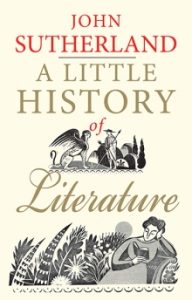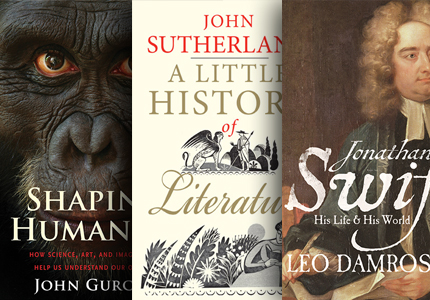The Absurdity of Existence: Franz Kafka and Albert Camus
Absurdist literature is notoriously difficult to read. Take, for example, Kafka’s short story, “The Metamorphosis,” in which the main character turns into a giant cockroach. Critics have produced countless different theories to explain the significance of Gregor Samsa’s transformation—and this diversity of interpretive meanings, John Sutherland proposes in A Little History of Literature, is the paradoxical result of a type of literature that takes the meaninglessness of life as its premise. In the following excerpt, Sutherland introduces Kafka’s literary mission to assert the pointlessness of literature, and discusses his influence on another writer who grappled constantly with the problems of existentialism and absurdism, Albert Camus. Check out the rest of our Little Histories here.
If you made a list of the most gripping opening lines in literature, the following would surely make it into the top ten:
As Gregor Samsa awoke one morning from uneasy dreams he found himself transformed in his bed into a gigantic insect.
It is from a short story, “The Metamorphosis,” by Franz Kafka (1883–1924). It’s probable that Kafka did not much care whether we read this sentence or anything that he wrote. He instructed his friend and executor Max Brod to burn his literary remains “preferably unread” after his death—he died prematurely, aged forty, from tuberculosis. Brod, thankfully, defied the instruction. Kafka speaks to us despite Kafka.
The human condition, for Kafka, is well beyond tragic or depressed. It is “absurd.” He believed that the whole human race was the product of one of “God’s bad days.” There is no “meaning” to make sense of our lives. Paradoxically that meaninglessness allows us to read into Kafka’s novels such as The Trial (which is about a legal “process” which doesn’t process anything), or his stories like “The Metamorphosis,” whatever meanings we please. For example, critics have viewed Gregor Samsa’s transformation into a cockroach as an allegory of anti-Semitism, a grim forecast of the criminal extermination of a supposedly “verminous” race. (Kafka was Jewish, and just a little older than Adolf Hitler.) Writers often foresee such things coming before other people do. “The Metamorphosis,” published in 1915, has also been seen as foreshadowing the collapse of the Austro-Hungarian Empire in 1918, after the First World War. Kafka and his fellow citizens in Bohemia, centered in Prague, had lived under that vast empire. They woke up suddenly to find their identities had vanished. Others have read the story in terms of Kafka’s problematic relationship with his father, a coarse-grained businessman. Whenever Franz nervously gave his father one of his works, it would be returned unread. His father despised his son.
But any such “meanings” crumple because there is no larger or underlying meaning in the Kafka universe to underpin them. Yet absurdist literature still had a mission—to assert that literature is, like everything else, pointless. Kafka’s disciple, the playwright Samuel Beckett, put it well: the writer “has nothing with which to express, nothing from which to express, no power to express, no desire to express, together with the obligation to express.”
[ . . . ]
Albert Camus’s opening proposition in his best-known essay, “The Myth of Sisyphus,” is that “There is but one truly serious philosophical problem and that is suicide.” It echoes Kafka’s bleak aphorism: “A first sign of the beginning of understanding is the wish to die.” Why not, when life is pointless? Camus’s essay pictures the human condition in the mythical figure Sisyphus, doomed for eternity to roll a rock up a hill, only for it to fall down again. Pointless. Only two responses are feasible in the face of man’s Sisyphean fate: suicide or rebellion. Camus appended a long note—”Hope and the Absurd in the Works of Franz Kafka”—to his Sisyphus essay, commemorating the writer to whose influence he was indebted.
Kafka’s influence is evident in Camus’s fictional masterpiece The Outsider, written and published under Nazi occupation censorship. The action is set in Algiers, nominally part of Metropolitan France. The narrative opens bleakly: “Mother died today. Or maybe yesterday: I can’t be sure.” Nor does the French Algerian hero, Meursault, care. He cares about nothing. He has, he confides, “lost the habit of noting his feelings.” For no particular reason, he shoots an Arab. His only explanation, not that he troubles to come up with explanations, even to save his life, is that it was very hot that day. He goes to the guillotine, not even caring about that. He hopes the crowd watching the execution will jeer.
It was Camus’s comrade in philosophy, Jean-Paul Sartre, who perceived, most clearly, what drastic things Kafka had done to fiction’s rule book. Generically, as Sartre wrote in a digression in his novel Nausea (1938), the novel presumes to makes sense, fully aware that life doesn’t make sense. This “bad faith” is its “secret power.” Novels, said Sartre, are “machines that secrete spurious meaning into the world.” They are necessary, but intrinsically dishonest. What else do we have in life other than the “spurious meanings” we invent?
—Excerpt from A Little History of Literature, John Sutherland
John Sutherland, Lord Northcliffe Professor Emeritus of Modern English Literature, University College London, has taught students at every level and is the author or editor of more than 20 books. He lives in London.






Camus’ absurd theory and Sartre’s existentialist theory go together hand in hand. This can be seen clearly in the novel ‘The Stranger.’ As discussed in the blog, Meursault — the main character — has no care in the world. He lives to live, and nothing else. He doesn’t react to things through society’s expectations, therefore, he is a threat. Although Meursault is pressured by several people (The Other) he remains true to himself — true faith. He accepts his fate of death and deals with it. He does not struggle or try to escape, rather he understands.
This novel combines Camus and Sartre’s theories in a way that relates to life as it is.
The Other definitely plays a crucial role in the way people live their lives. One is expected to act a certain way and follow cultural norms. Many of our most common habits are simply conditioned responses that serve no purpose other than to feel a connection with the rest of society.
For example: “Hi, how are you?”, “Good, how are you?”
This is an automatic response. Even if it is a lie, and one is not “good”, that’s what one will say. People who act differently will be an outcast. Meursault reacted honestly instead of socially acceptable and for this he is a threat, as you said. Sartre’s idea of true faith is the ideal way to live. Do what you want to do and ignore everyone else.
Why do they continue to paint a purposeless life as despressing? I find it the complete opposite, and I believe that is what Meursault realized as well. I see the story of “Metamorphosis” more as humorous than saddening. I was not given a purpose upon birth. There is no where I need to go, nothing I need to do. I can do whatever I want and become whoever I choose with the view of “existence precedes essence”. Life is a write-your-own-adventure story.
But how would people go about making their own adventure when there is no purpose to do so? People have feelings, which gives them purpose. To say that there is absolutely no purpose in life would mean to say that there shouldn’t be people still around at all. How could there still be life on earth if there is no meaning whatsoever? There wouldn’t be adaptations or evolution, because why should there be? No purpose would mean no drive to survive. If ‘existence precedes essence’ then there wouldn’t be much life left. If something was formed without the drive to survive or to find purpose, then they wouldn’t adapt or wouldn’t want to adapt. Therefore, life would be the same as it was millions of years ago.
When I say write-your-own life, this means you can create your own purpose. The purpose to create a purpose, so to speak, is to find happiness. No one has to find a purpose. There are many people who do next to nothing in life and feel little joy. That is why we go out and create an adventure: to have fun, to meet other people, to feel good.
I agree that humans were born with natural instincts such as survival and things of that natural. But survival isn’t a fulfilling purpose, so that is what humans search for.
When one is born, one is not without drive. One has those natural reflexes and instincts to live. You are innocent and believe what your parents tell you: that everything is okay. As one grows older, one can see how little purpose there is and begin to develop that need for purpose. Our understanding of the world was not knowledgable at the time of our birth. We need time to see the bigger picture.
Camus and Kafka, the deep writing
Camus and Kafka are not absurd. As literature is a way of describing real life and mental with metaphors, but they reveal the essential existence. What is essential in this literature is to show the loneliness and oppression, through the expression. Phrases and absurd disguise the narrative of symbols, but one recognizes the meaning, what the authors wanted to reveal: the human condition subjected by an ungrateful and inhuman society. These meanings presented in an unusual way is the art of difference, originality. Both authors showed us his personal tragedy, and opened new paths to literature. They are paradigms of deep writing that offers non-visible dimensions of everyday human tragedy.
See my Camus’s review: http://www.letraslibres.com/autores/antonio-ramos-z
Camus uses his novel, The Stranger, to show his theory of absurdism. He uses Mers. as a way to relay his theory as a story. Camus just takes Mers. level of absurdism to the next level so it can really be seen. When, “For no particular reason, [Mers.] shoots an Arab. (para. 7)” the reasoning Camus had put it in was to see if Mers. would feel emotion when he had done it. The first shot was the key one were he hesitated to think about what he had just done, the four that followed proved the point that Mers. didn’t really care for life and that it was ‘absurd’. Anything that Mers. did wouldn’t reflect him in anyone in any after life because there wouldn’t be any.